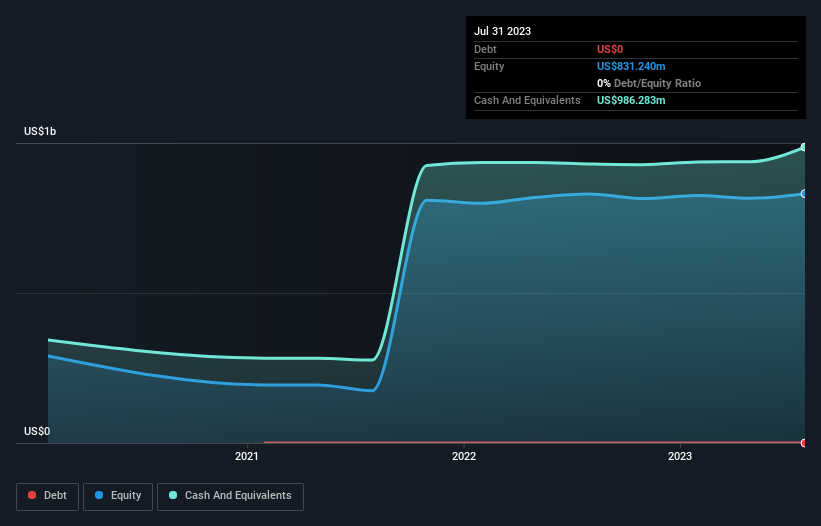
There's no doubt that money can be made by owning shares of unprofitable businesses. For example, biotech and mining exploration companies often lose money for years before finding success with a new treatment or mineral discovery. But the harsh reality is that very many loss making companies burn through all their cash and go bankrupt.
Given this risk, we thought we'd take a look at whether GitLab (NASDAQ:GTLB) shareholders should be worried about its cash burn. For the purpose of this article, we'll define cash burn as the amount of cash the company is spending each year to fund its growth (also called its negative free cash flow). First, we'll determine its cash runway by comparing its cash burn with its cash reserves.
See our latest analysis for GitLab
Does GitLab Have A Long Cash Runway?
A company's cash runway is calculated by dividing its cash hoard by its cash burn. In July 2023, GitLab had US$986m in cash, and was debt-free. Importantly, its cash burn was US$138k over the trailing twelve months. That means it had a cash runway of very many years as of July 2023. While this is only one measure of its cash burn situation, it certainly gives us the impression that holders have nothing to worry about. Depicted below, you can see how its cash holdings have changed over time.

How Well Is GitLab Growing?
Given our focus on GitLab's cash burn, we're delighted to see that it reduced its cash burn by a nifty 100%. And there's no doubt that the inspiriting revenue growth of 51% assisted in that improvement. Overall, we'd say its growth is rather impressive. While the past is always worth studying, it is the future that matters most of all. So you might want to take a peek at how much the company is expected to grow in the next few years.
How Easily Can GitLab Raise Cash?
We are certainly impressed with the progress GitLab has made over the last year, but it is also worth considering how costly it would be if it wanted to raise more cash to fund faster growth. Issuing new shares, or taking on debt, are the most common ways for a listed company to raise more money for its business. Many companies end up issuing new shares to fund future growth. By looking at a company's cash burn relative to its market capitalisation, we gain insight on how much shareholders would be diluted if the company needed to raise enough cash to cover another year's cash burn.
Since it has a market capitalisation of US$6.6b, GitLab's US$138k in cash burn equates to about 0.002% of its market value. That means it could easily issue a few shares to fund more growth, and might well be in a position to borrow cheaply.
So, Should We Worry About GitLab's Cash Burn?
It may already be apparent to you that we're relatively comfortable with the way GitLab is burning through its cash. In particular, we think its cash burn reduction stands out as evidence that the company is well on top of its spending. And even its cash burn relative to its market cap was very encouraging. After considering a range of factors in this article, we're pretty relaxed about its cash burn, since the company seems to be in a good position to continue to fund its growth. On another note, we conducted an in-depth investigation of the company, and identified 4 warning signs for GitLab (1 is a bit concerning!) that you should be aware of before investing here.
Of course, you might find a fantastic investment by looking elsewhere. So take a peek at this free list of interesting companies, and this list of stocks growth stocks (according to analyst forecasts)
New: Manage All Your Stock Portfolios in One Place
We've created the ultimate portfolio companion for stock investors, and it's free.
• Connect an unlimited number of Portfolios and see your total in one currency
• Be alerted to new Warning Signs or Risks via email or mobile
• Track the Fair Value of your stocks
Have feedback on this article? Concerned about the content? Get in touch with us directly. Alternatively, email editorial-team (at) simplywallst.com.
This article by Simply Wall St is general in nature. We provide commentary based on historical data and analyst forecasts only using an unbiased methodology and our articles are not intended to be financial advice. It does not constitute a recommendation to buy or sell any stock, and does not take account of your objectives, or your financial situation. We aim to bring you long-term focused analysis driven by fundamental data. Note that our analysis may not factor in the latest price-sensitive company announcements or qualitative material. Simply Wall St has no position in any stocks mentioned.
About NasdaqGS:GTLB
GitLab
Through its subsidiaries, develops software for the software development lifecycle in the United States, Europe, and the Asia Pacific.
Excellent balance sheet slight.

